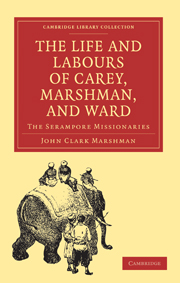Summary
Mr Carey's letter, announcing that under the new system of covenants, missionaries might be introduced into the country as assistant indigo planters, reached Mr Fuller in August 1798, and such was his indomitable energy, that, within nine months, four missionaries were sailing down the Thames on their way to Mudnabatty. Two of these, Mr Grant and Mr Brunsden, men of great zeal and much promise, were cut off in the dawn of their career, but the two other members of the party, Mr Ward and Mr Marshman, were destined, in the course of Providence, to be associated with Mr Carey in the establishment of the Serampore Mission, of which the present work is a brief record.
William Ward was born at Derby, on the 20th of October 1769, the son of a carpenter and builder, who died while he was a child. The charge of his education devolved on his mother, a woman of great energy of character and exemplary piety, to whose instructions he was indebted for those religious impressions which preserved him from the common dangers of youth. Under the tuition of Mr Congreve and Mr Breary of Derby he became proficient in the ordinary branches of learning, but for those mental accomplishments which adorned his subsequent career he was indebted to his own exertions, On leaving school he was apprenticed to Mr Drury, then at the head of a large printing establishment in the town.
- Type
- Chapter
- Information
- The Life and Labours of Carey, Marshman, and WardThe Serampore Missionaries, pp. 41 - 72Publisher: Cambridge University PressPrint publication year: 2010First published in: 1864

